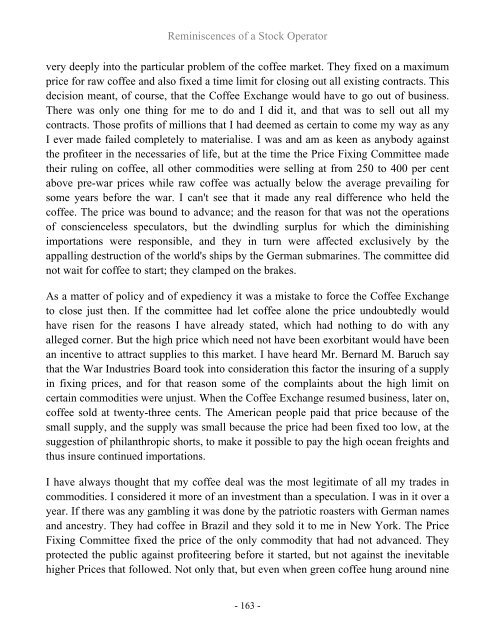Create successful ePaper yourself
Turn your PDF publications into a flip-book with our unique Google optimized e-Paper software.
Reminiscences of a Stock Operator<br />
very deeply into the particular problem of the coffee market. They fixed on a maximum<br />
price for raw coffee and also fixed a time limit for closing out all existing contracts. This<br />
decision meant, of course, that the Coffee Exchange would have to go out of business.<br />
There was only one thing for me to do and I did it, and that was to sell out all my<br />
contracts. Those profits of millions that I had deemed as certain to come my way as any<br />
I ever made failed completely to materialise. I was and am as keen as anybody against<br />
the profiteer in the necessaries of life, but at the time the Price Fixing Committee made<br />
their ruling on coffee, all other commodities were selling at from 250 to 400 per cent<br />
above pre-war prices while raw coffee was actually below the average prevailing for<br />
some years before the war. I can't see that it made any real difference who held the<br />
coffee. The price was bound to advance; and the reason for that was not the operations<br />
of conscienceless speculators, but the dwindling surplus for which the diminishing<br />
importations were responsible, and they in turn were affected exclusively by the<br />
appalling destruction of the world's ships by the German submarines. The committee did<br />
not wait for coffee to start; they clamped on the brakes.<br />
As a matter of policy and of expediency it was a mistake to force the Coffee Exchange<br />
to close just then. If the committee had let coffee alone the price undoubtedly would<br />
have risen for the reasons I have already stated, which had nothing to do with any<br />
alleged corner. But the high price which need not have been exorbitant would have been<br />
an incentive to attract supplies to this market. I have heard Mr. Bernard M. Baruch say<br />
that the War Industries Board took into consideration this factor the insuring of a supply<br />
in fixing prices, and for that reason some of the complaints about the high limit on<br />
certain commodities were unjust. When the Coffee Exchange resumed business, later on,<br />
coffee sold at twenty-three cents. The American people paid that price because of the<br />
small supply, and the supply was small because the price had been fixed too low, at the<br />
suggestion of philanthropic shorts, to make it possible to pay the high ocean freights and<br />
thus insure continued importations.<br />
I have always thought that my coffee deal was the most legitimate of all my trades in<br />
commodities. I considered it more of an investment than a speculation. I was in it over a<br />
year. If there was any gambling it was done by the patriotic roasters with German names<br />
and ancestry. They had coffee in Brazil and they sold it to me in New York. The Price<br />
Fixing Committee fixed the price of the only commodity that had not advanced. They<br />
protected the public against profiteering before it started, but not against the inevitable<br />
higher Prices that followed. Not only that, but even when green coffee hung around nine<br />
- 163 -


